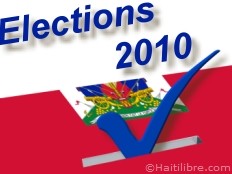After several discussions, the organizations signatory of this letter, in order to contribute to resolving the electoral crisis, take the liberty to make the following considerations and proposals.
1. The irregularities, systemic fraud in favor of a political formation and the acts of violence that marred the election on November 28 have exacerbated the mess that is today the nation of Haiti. We can not get out of this election crisis, if the light is not made on what really happened during these elections, not only within and around the polling centers but also at the level of the transfer of results between the polling stations, the tabultion center and the Site of CEP.
2. An operation of verification and evaluation is therefore essential. According to the draft Agreement between the OAS, the President of the Republic and the CEP, we read, an expert mission would be required to "review the practices, procedures and processes used in elections". This would be an in-depth work, including not only the comparison of data of Tabulation Center and Minutes but also to all electoral documents namely "electoral lists partial, sheets of ballot counting, reports of irregularities, supporting documents from each office" In addition, a statistical analysis of results would be made to "identify anomalies in these results. "
3. Such a method of work would certainly valid. However, this initiative has four major weaknesses. First, it is not based on any legal or constitutional basis. Only a political consensus may confer some legitimacy. In addition, the operation is only for presidential elections. But the parliamentary elections, which are equally important, have suffered similar fraud and require the same remedies. Then, the OAS-CARICOM mission because of its convenience to the Provisional Electoral Council and the powers in be, suffering from a serious lack of credibility with the Haitian people. Indeed, if the Mission had fulfilled the first objective of any specific Observation Mission of the OAS, which is "to observe the performance of key players in the electoral process to verify their compliance with electoral laws of the host country" it would have strongly denounced the serious irregularities committed by the CEP. For example: the illegal replacement of Supervisors, the arbitrary appointment of members of polling stations, barriers erected to prevent representatives from exercising their function, the massive relocation of voters, which has deprived thousands of citizens the opportunity to vote. The CEP has exceeded all limits of decency because he was assured the full support of the OAS-CARICOM mission. Finally, if the OAS General Secretariat has consulted the Governments of Canada, France and the United States of America to call this mission of experts, it did not appeal to the Haitian. Haitian experts, that know the Haitian electoral system and enjoys the confidence of the public and candidates to the various elective positions could improve the effectiveness and credibility of such operation. After all, it is the Haitian elections which are initially the matter of Haitians.
4. A good audit-evaluation of the electoral process conducted by national and international experts, accepted by the various protagonists, would restore the truth and fix responsibility. The exact knowledge of facts and data, would also help to make a rational decision, just and responsible in relation to elections on November 28.
5. To be viable and operational, any solution must be the objet of a consensus between the different actors involved in the process: political parties, candidates, representatives of the Executive, the CEP, civil society at the broad sense the international community. The initiative of a dialogue in this direction should be taken.
6. Moreover, the organizations signatory of this recommend strongly to the President of the Republic to observe scrupulously the requirements of the Constitution which in its article 134.1, fix the end of the presidential term to February 7 of the 5th year of its mandate. Any extension would not only unconstitutional but also prejudicial to social peace, national stability and the holding of good elections. The recent history of the country showed that the presence of a Judge of the Supreme Court (Cour de Cassation) in charge of the country to organize the elections, represents a guarantee for the realization of an acceptable poll. This was the case for Mes Ertha Pascal Trouillot and Boniface Alexandre.
7. From late December to February 7, we could conduct the verification process-assessment, identify corrective actions, including necessary changes in the Electoral Council, which today has lost all credibility.
Signatories:
Initiative de la Société Civile (ISC) : Rosny Desroches
Conseil Haïtien des Acteurs Non Etatiques (CONHANE) : Edouard PaultreInitiative
Citoyenne (IC) : Jean Garry Denis
Centre Œcuménique des Droits de l’Homme (CEDH) : Jean-Claude Bajeux
Office de Concertation pour le Développement (OCODE) : Dominique Joseph
Action Citoyenne : Bellegarde Berthony
Centre pour la Promotion des Droits Humains et de la Démocratie en Haiti (CEPRODHD) : Jn Gardy Théodore
Barreau de Port-au-Prince : Kedler Augustin
HL/ HaitiLibre / Initiative Société Civile (ISC)

No comments:
Post a Comment